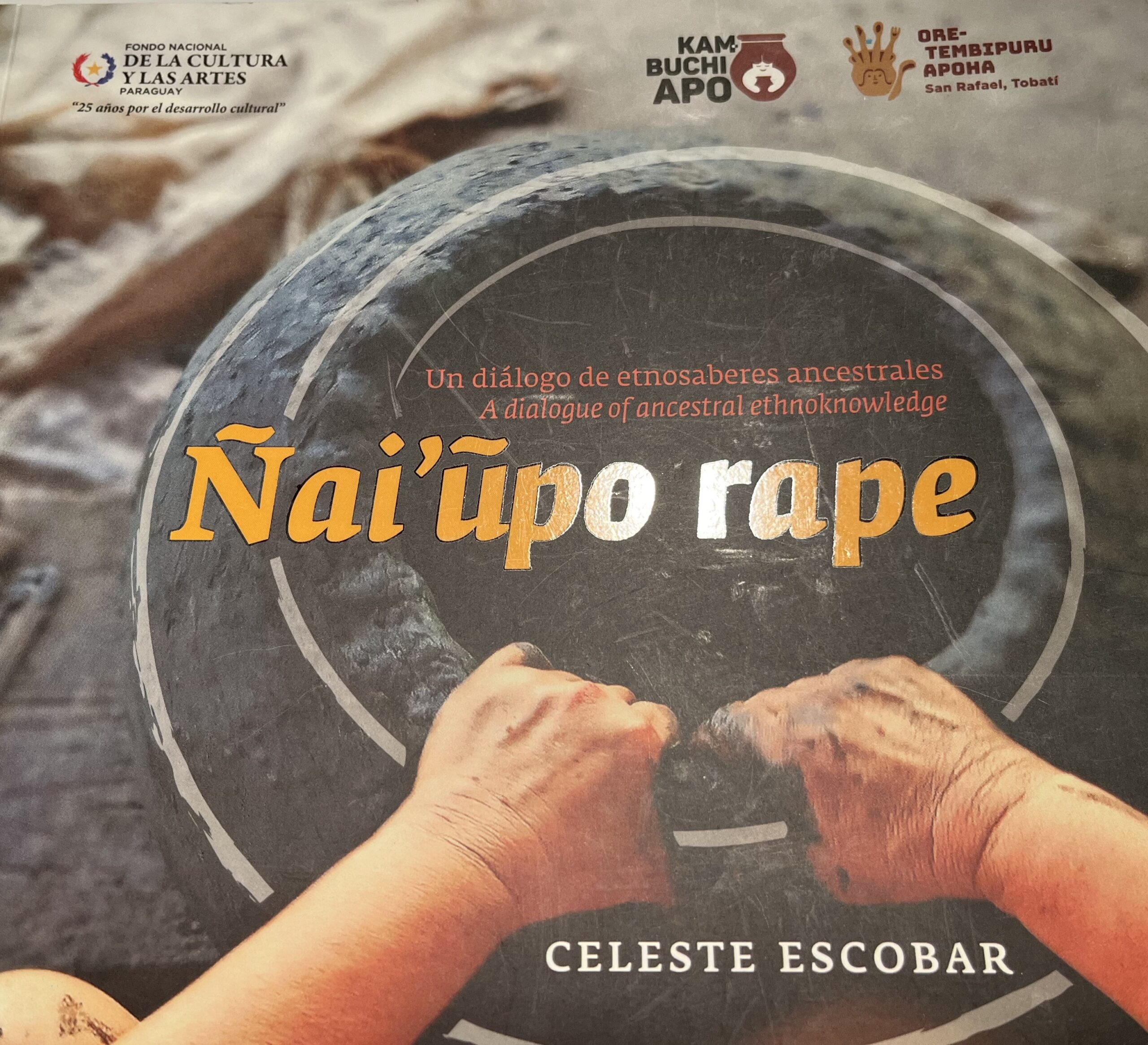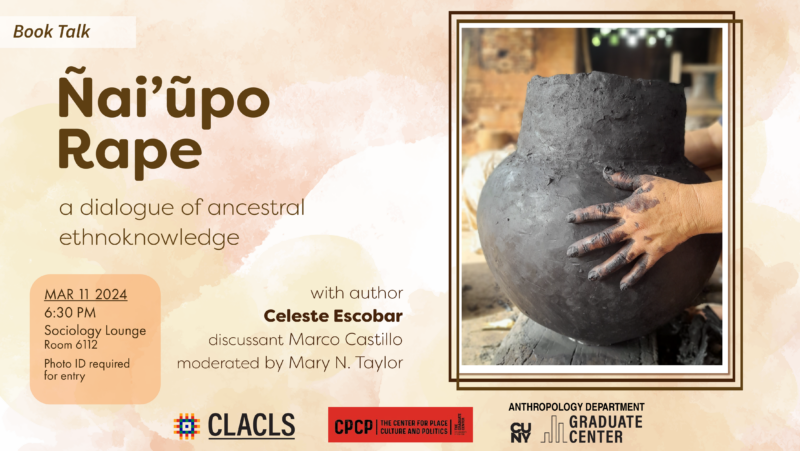Monday, March 11, 6:30 PM
The Graduate Center CUNY (365 Fifth Avenue)
Room 6112 (sociology lounge)

Ñai’ũpo Rape: A Dialogue of Ancestral Ethnoknowledge.
Book Talk with author Celeste Escobar
Please join us as Celeste Escobar introduces her 2023 book Ñai’ũpo Rape: a dialogue of ancestral ethnoknowledge. Marco Castillo will join Celeste in as discussion and Mary N. Taylor will moderate.
ABOUT THE BOOK:
In each country, the dominant history has excluded the visual narratives of the communities, belittling their existence, simplifying their ways of life, violating their diversity.
Abrahan Nahón (2023)
This material constitutes a compendium of oral testimonies of the makers of ñai’ũpo (ceramic’s making) from three communities: Peguahó of Yaguarón in the department of Paraguarí, Caaguazú de Itá of the Central department and the San Rafael neighborhood of 21 de Julio de Tobatí of the Cordillera department of Paraguay
Following Sturtevant (1964) definition of the term ethno as a system of knowledge specific to a given culture and, in this case, a cultural context of the ancestral art craftmanship of ñai’ũpo (ceramics making) in Guaraní language (Tupí-Guaraní), the various cultural contexts can be considered different ethnos, in this case focused on specific groups dedicated to the trade (Ramalho 2011; 2012) mentioned in a set of ethno-knowledges. The ethno-knowledge accumulated over time is deeply impregnated and transmitted in the culture of native speakers and even more so if they have been socialized in the language in question since early childhood (Escobar 2021a).
The cultural context of this record implies more than 300 years of uninterrupted history of transmission of this system of ethno-knowledge through oral language and, mainly, through generations of women (Susnik 1998: 197; Pla 1994; Jones 2021: 90-92). Building bridges between living orality and the written word, as well as transcending to other languages (Spanish and English) in order to communicate from the voices of those who have inherited and live their life stories in this ancestral craft, has been the focus of this approach.
The content of this material shows a panorama of this historical exchange in the trajectory of an ancestral craft that resists in cultural and linguistic terms, despite the pressures of industrialization, technological advances and the cultural homogenization promoted by the global economy. As well as, these testimonies of stories accompanied by the ethnographic visual record not only teach us particularities of the shared ceramic technique and of each community, but also interpellate us to enter into lives that for generations have maintained an identity of Guarani legacy.
The above refers us to a ceramic craft of ancestral origin, as an aesthetic artistic manifestation, which vindicates the collective identity as an affirmation and linguistic and cultural visibility. The ñai’ũ (black clay as a natural resource culturally intervened) and the ñe’ẽ (language) effectively and affectively unite the makers in these communities, since they are the main means of tangible and intangible expression in this craft. This amalgam also demonstrates the strength and potential of art (in this case, of the ceramic craft) linked to language in order to foster retention and recovery processes as a survival strategy that should gain recognition and respect.
Register for the event here.

About the Speakers:
Celeste Escobar is an anthropologist and linguist whose cultural affairs and research work has greatly contributed to the revaluing and safeguarding of the cultural heritage and expressions of diverse local and indigenous communities in her home country Paraguay. Currently, she is a consultant to UNESCO and she has been working since 2019 as a research professor at the National University of Itapua (UNI), Paraguay. In 2020, she was awarded the distinction of “Indigenous Languages and Cultural Promoter of Paraguay” by the National Committee on the Year of International Indigenous Languages declared by UNESCO. Over the past year, the author launched and has continuously been updating the digital web platform for indigenous languages revitalization: www.tapeavyu.com. She is Guarani speaker and has been learning Ñai’ũpo (ceramic’s making) since 2012.
Marco Castillo is a Ph.D. candidate in sociology at the City University of New York’s Graduate Center. His research seeks to understand political violence in dictatorial and post-dictatorship settings, political resistance, and how they relate to the production of knowledge and policy. He focuses mainly on Paraguay as a case study to examine how processes of dictatorship and democratization evolve in terms of repression against minorities, rights, citizenship, and inequality in Latin America. His dissertation explores the constitution and uses of the former Paraguayan secret police files known as the “Archives of Terror”. He is the current director of research at the Center for Latin American, Caribbean, and Latino Studies (CLACLS).
This event is organized and sponsored by the Center for Place, Culture and Politics, the Center for Latin American Caribbean and Latino Studies, and the Department of Anthropology, at the CUNY Graduate Center. It is free and open to the public (picture ID needed to enter building)



